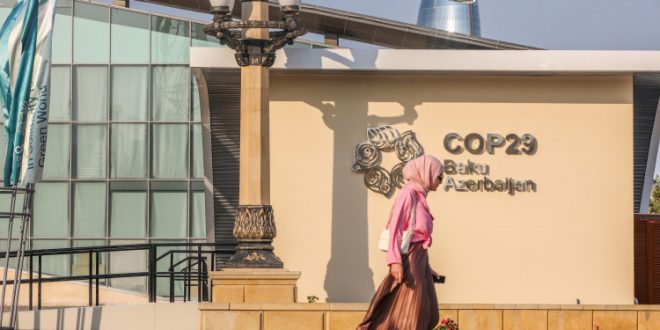The following article is based on research conducted under the State Department’s Title VIII Fellowship, for the Black Sea Program at MEI. During summer 2024, the author traveled to Baku and Karabakh and interviewed 15 policymakers from various government ministries, the private sector, academia, the parliament, and energy agencies.
Azerbaijan seeks to establish itself as a major actor in the global energy transition space as it prepares to host the 2024 United Nations Climate Change Conference (29th Conference of the Parties, COP29) in Baku, on Nov. 11-22. Through a number of international partnerships — including joint ventures with Masdar to build 1 gigawatt (GW) of solar and wind power capacity and cooperation with BP on a 240-megawatt (MW) solar facility in Jabrayil — the country is demonstrating its dedication to clean energy, with an emphasis on renewable sources. Additionally, Azerbaijan is concentrating on hydropower projects, with the goal of achieving 500 MW of capacity by 2030, designating Karabakh as a “green energy zone.” Globally, Azerbaijan is raising its profile by participating in the US-Azerbaijan Green Energy Forum and exploring a Black Sea submarine cable project with Georgia, Romania, and Hungary as a means to export clean electricity to Europe.
Azerbaijani-US energy relations
Azerbaijan’s significant oil and natural gas resources and expanding renewable energy projects have made it an important partner for Europe as the latter searches for alternatives to Russian energy. In turn, the United States has been cultivating closer ties with Azerbaijan in recognition of its strategic importance to improving the European energy security situation, especially the keystone Southern Gas Corridor project, which Baku spearheaded and in large part financed. Besides working together on vital infrastructure projects like power-production facilities and energy transit corridors, this improving bilateral partnership involves US investments in Azerbaijan’s renewable energy industry. At the same time, new investments from countries like Saudi Arabia, the United Kingdom, and the United Arab Emirates reinforce Azerbaijan’s significance in the energy transformation of the wider Caspian Sea region.
COP29 offers many opportunities to improve US-Azerbaijani energy cooperation, including by coordinating the United States’ clean energy technology goals with Azerbaijan’s renewable energy revolution. Conversations that have recently taken place between representatives of Azerbaijan and US Secretary of Energy Jennifer Granholm highlight this possibility of working together on energy security and renewable energy initiatives. Second, the US can help Europe diversify its energy supply and lessen its reliance on Russian gas by assisting Azerbaijan’s energy reform. The European Union presently receives around 5% of its gas from Azerbaijan; thus, the EU-Azerbaijani partnership is an important element for ensuring the energy security of the continent.
Supporting US allies and third countries
As noted above, Azerbaijan’s energy transition, particularly with support from the United States, can significantly contribute to guaranteeing a dependable energy supply to Europe, and neighboring Central Asia as well, while reducing the influence of Russia and Iran in Southeastern Europe, the South Caucasus, and Central Asia. Additionally, by working together, geopolitical linkages may be strengthened and a more robust and diverse transcontinental energy network may be promoted throughout the area.
This assistance improves relations with nations that uphold democratic and liberal economic principles while also promoting stability in the area. With its planned focus on sustainable energy practices and technology transfer, the next COP, in Baku, presents a special chance for the US and Azerbaijan to strengthen their collaboration on renewable energy initiatives.
Navigating a new era of US climate leadership
By carefully utilizing foreign alliances and collaborative projects and initiatives, the United States has a great chance to take the lead again in global climate efforts. This strategy includes financial assistance in addition to the exchange of technological know-how to speed up the switch to clean energy. To accelerate the global adoption of clean technologies, climate financing in renewable energy infrastructure and research is essential. The US can establish itself as a major force behind global climate development by giving priority to these areas.
Additionally, the United States has a great chance to improve its reputation internationally by coordinating its climate efforts with Azerbaijan’s COP29 renewable energy targets. The US can bolster its participation in global climate mitigation and exhibit its commitment to international climate objectives by supporting Azerbaijan’s shift to non-hydrocarbon energy sources. The US’s standing as a pioneer in sustainable development is bolstered by this relationship, which also demonstrates the country’s commitment to cooperative methods of combating climate change. Such initiatives strengthen the United States’ position as a key actor in determining global climate policy by fostering a more forceful and cohesive international response to climate concerns.
Until now, oil and gas have been the main focus of US and EU investments in Azerbaijan’s energy industry; renewable energy initiatives are still in their infancy. From the US side, corporations such as ExxonMobil and Chevron have been active in Azerbaijan’s oil industry for years. And BP has been a key partner in Azerbaijan’s offshore oil and gas extraction efforts as well as hydrocarbon exports to Europe.
More recently, the US-Azerbaijan Green Energy Forum has highlighted American companies looking to contribute to Azerbaijan’s clean energy ecosystem, despite the lack of precise statistics on US investments in the country’s renewable energy industry. European programs like EU4Energy and EU4Climate have already been assisting Azerbaijan’s transition to a sustainable energy source. Furthermore, Azerbaijan and the EU signed a new memorandum of understanding (MoU) on Strategic Partnership in the Energy Field in 2022, which may open the door to closer collaboration in the renewable energy sector. And the “Support to Renewable Energy Auctions in Azerbaijan” initiative is now receiving funding from the European Bank for Reconstruction and Development (EBRD) in an effort to boost the South Caucasus country’s renewable energy industry.
Investment opportunities
Azerbaijan’s commitment to renewable energy and its aspirational targets to increase renewable energy capacity and drastically lower greenhouse gas emissions are highlighted on the official COP29 website. This pledge offers significant investment potential for US companies and is consistent with the larger goals of COP29. Due to Azerbaijan’s emphasis on increasing its output of renewable energy, American investors have a strong opportunity to participate in a market that is growing quickly: Azerbaijan’s renewable energy industry is projected to expand at a compound annual growth rate (CAGR) of 3.40%, from 8.17 GW in 2024 to 9.66 GW by 2029. And investment in this developing renewable energy sector is further encouraged by the country’s planned integration of green energy into its energy infrastructure.
Biden’s message to the Baku Energy Forum and COP29
This past June, US President Joe Biden sent a message to the participants of Baku Energy Week, which was read aloud by Harry Kamian, the senior advisor for multilateral energy diplomacy at the Bureau of Energy Resources in the US Department of State. In his statement, President Biden recognized Azerbaijan’s vital role in advancing international energy projects, especially in the shift to green energy. He underlined how crucial cooperation is between the US and Azerbaijan in promoting sustainable practices and energy security. Additionally, Biden emphasized Azerbaijan’s continuous efforts to lower its dependency on fossil fuels and increase its renewable energy initiatives, which can contribute to bilateral cooperation with the US.
US-China competition
The global competition between China and the United States in energy transition technology offers some crucial possibilities for Azerbaijan. First of all, Azerbaijan can strengthen its position in the global energy security arena and draw in investments from both superpowers. The nation may use its advantageous position to forge partnerships that fortify its renewable infrastructure, expedite its energy transition, and promote stability in the renewable energy sector. Second of all, Azerbaijan is well positioned to draw investment from both Chinese and American businesses due to its dual role as a major energy supplier to Europe and Asia. Finally, through the development of its renewable energy sector with simultaneous US and Chinese assistance, Azerbaijan may lessen its reliance on Russian energy supplies as well as aid its close partners in diversifying their energy sources.
At the same time, however, Azerbaijan will need to navigate potential economic pressure from siding too closely with one side over the other, which could put undue restrictions on growing its own renewable energy industry. As such, Azerbaijan’s energy transition plan will need to strike a balance with both powers.
The US role in the South Caucasus energy transition
In order to advance the energy transition throughout the South Caucasus, the United States is vital. The transfer of renewable energy technology and skills has already helped Azerbaijan, Georgia, and Armenia; and US corporations are being urged to further engage in regional projects like wind and solar farms. Financing and loan guarantees improve project feasibility by reducing investor risk. Encouraging regional cooperation via communication and joint energy projects enhances trade and infrastructure, attracting additional investment to the area.
Resolving conflicts like the one over Karabakh is crucial to launching new businesses and shifting funding from military to development. Through the reduction of greenhouse gas emissions and the use of fossil fuels, this strategy advances US geopolitical interests in the Eurasian area and is consistent with American climate goals. Building closer ties with the South Caucasus countries helps maintain stability in the area and makes it more appealing to US businesses seeking to engage in renewable energy.
In addition to positioning itself as a pioneer in renewable energy, Azerbaijan also generates strategic prospects for the US and Turkey through cooperation. Over the past several decades, Turkey and Azerbaijan have established strong energy cooperation through important projects like the Baku-Tbilisi-Ceyhan (BTC) oil pipeline and the Trans-Anatolian Natural Gas Pipeline (TANAP — a key link of the Southern Gas Corridor); today, they are developing the Igdir-Nakhchivan gas pipeline. Increasingly, however, the two allies are expanding their strategic partnership into renewable energy, such as the transmission of renewable power from Azerbaijan to Turkey and Europe via Nakhchivan. Moreover, high-level dialogues and regular energy forums have become a cornerstone of Azerbaijan and Turkey’s partnership, advancing joint efforts in various energy initiatives
Conclusion
Azerbaijan is establishing itself as a major player in the global energy revolution as it gets ready to host COP29 and advances its aims for renewable energy through partnerships with the United States and Turkey. This offers the US a strategic chance to strengthen bilateral ties, back allies that rely on Azerbaijani energy, and maintain its leadership in international climate measures. The congruence of US climate goals with Azerbaijan’s aspirations for COP29 presents noteworthy prospects for cooperation, including collaborative ventures and technological transfers, fortifying energy security and regional stability.
Chinese-US competition in the energy transition space provides certain key opportunities for Azerbaijan. The South Caucasus country can enhance its role in global energy security by deftly attracting renewable energy investments from both superpowers. If it succeeds in navigating this potentially challenging geopolitical environment, Azerbaijan will be able to form partnerships that advance regional stability and its energy transition objectives. US support for the South Caucasus through investments and technology transfers may advance these aims and ultimately lead to a more stable and interlinked global energy market.





